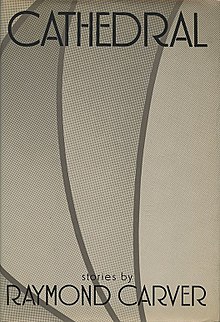Cathedral (short story collection)
 First edition cover, 1983 | |
| Author | Raymond Carver |
|---|---|
| Language | English |
| Genre | Short story |
| Publisher | Knopf |
Publication date | 1983 |
| Publication place | United States |
| Media type | |
| Pages | 228 |
| 813/.54 | |
| LC Class | PS3553.A7894 C3 1983 |
Cathedral is the third major-press collection of short stories by American writer Raymond Carver, published in 1983.[1] It received critical acclaim and was a finalist for the 1984 Pulitzer Prize for Fiction.[2]
Reception
[edit]Cathedral was enthusiastically received by critics. In The New York Times book Review, critic Irving Howe wrote:
Mr. Carver has been mostly a writer of strong but limited effects - the sort of writer who shapes and twists his material to a high point of stylization. In his newest collection of stories, Cathedral, there are a few that suggest he is moving toward a greater ease of manner and generosity of feeling; but in most of his work it's his own presence, the hard grip of his will, that is the strongest force. It's not that he imposes moral or political judgments; in that respect, he's quite self-effacing. It's that his abrupt rhythms and compressions come to be utterly decisive."[3]
The Washington Post wrote that "there are no arid places in Cathedral. Instead there are a dozen stories that overflow with the danger, excitement, mystery and possibility of life."[4]
The stories
[edit]The collection contains the following stories:
- "Feathers" - A couple visit another couple who have a peacock and a baby.
- "Chef's House" - Wes rents Chef's house by the ocean and asks wife Edna to come live with him again.
- "Preservation" - Sandy's husband has taken to the sofa since he lost his job as a roofer three months before.
- "The Compartment" - Myers, vacationing in Europe, takes a train to meet his son, who he hasn't seen in eight years.
- "A Small, Good Thing" - An extended version of his earlier short story "The Bath". Scotty, 8, is hit by a car.
- "Vitamins" - Patti decides to sell vitamins door-to-door.
- "Careful" - Lloyd and wife Inez are living separately but she helps him with a problem.
- "Where I'm Calling From" - At Frank Martin's drying out facility with JP, Tiny, and other residents.
- "The Train" - Miss Dent waits in a train station late at night after she used a gun to force a man to kneel and plead for his life.
- "Fever" - Carlyle has trouble finding a babysitter after his wife leaves him and the kids for California.
- "The Bridle" - Marge, a woman who supervises an apartment building in Arizona with her husband Harley, tells the story about a family that moves into an apartment after being displaced from their farm in Minnesota.
- "Cathedral" - Narrated by a man whose wife is old friends with a blind man, the story shows the husband/narrator's distaste for the blind man who is coming to visit him and his wife for a few days. At times it seems that the man is jealous of the blind man for being so close to his wife; at other times it seems that the husband is disgusted by the man's blindness. In the end they bond in a way through the communication they share about what a cathedral looks like.
References
[edit]- Carver, Raymond. Cathedral New York: Knopf (1983); London: Collins (1984)
- ^ "CATHEDRAL | Kirkus Reviews" – via www.kirkusreviews.com.
- ^ "Cathedral, by Raymond Carver (Knopf)". The Pulitzer Prizes. Retrieved November 3, 2023.
- ^ Irving Howe, "Stories of Our Loneliness," The New York Times Book Review, September 11, 1983.
- ^ Yardley, Jonathan (September 4, 1983). "Ordinary People From An Extraordinary Writer" – via www.washingtonpost.com.
External links
[edit]- Stephen King on Raymond Carver in The New York Times Book Review
- Irving Howe on Cathedral and "A Small, Good Thing" in The New York Times Book Review
